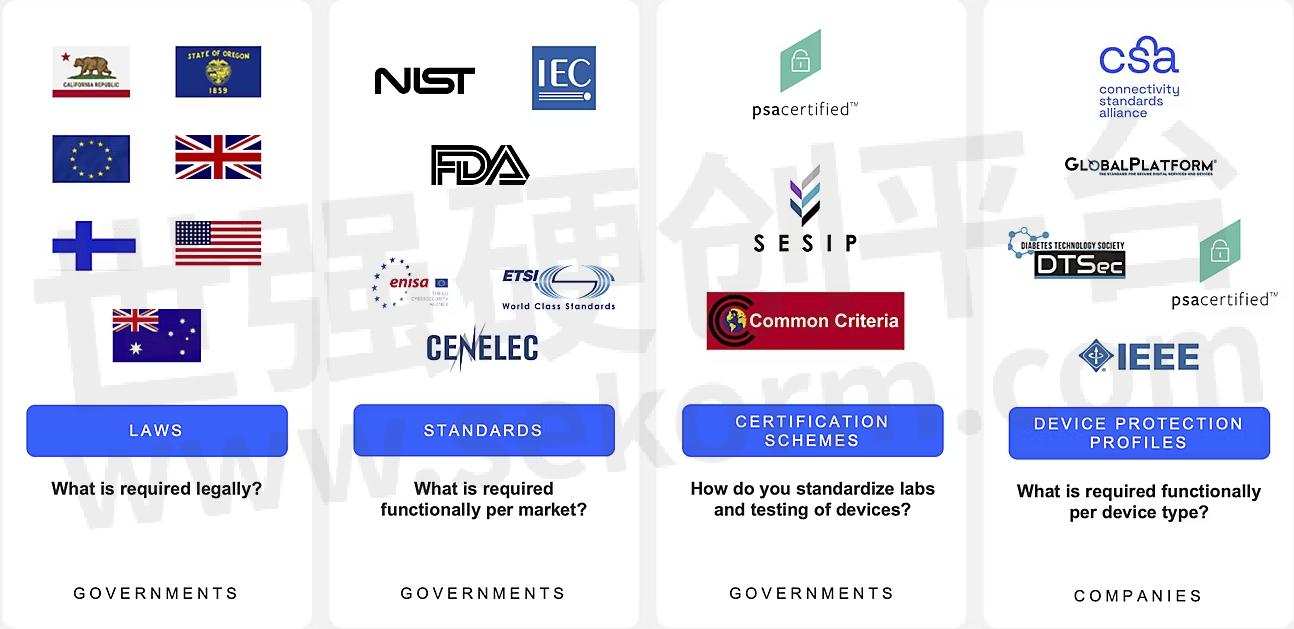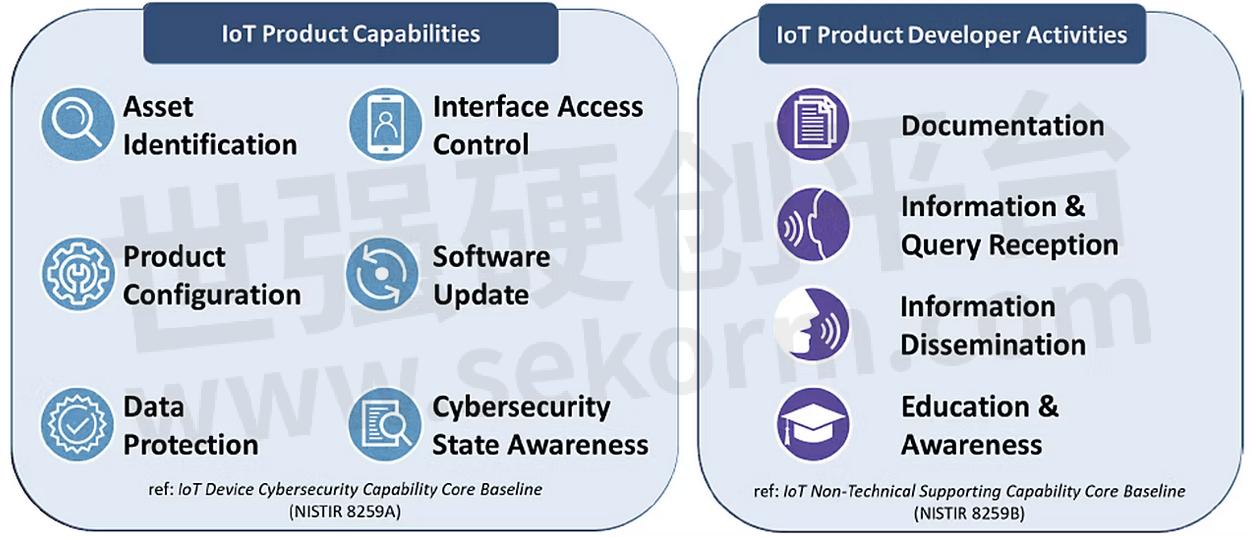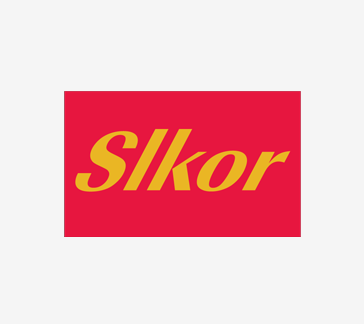Navigate the New IoT Labeling Program with Silicon Labs’ Best-In-Class Security


Securing the IoT is challenging. It’s also mission critical. As more devices become connected, the potential for IoT threats also increases, which has led governments and regulatory bodies to take action to protect consumers and has also incentivized manufacturers to prioritize cybersecurity. To help consumers better navigate this evolving landscape, today the White House officially launched its voluntary national cybersecurity IoT labeling program, U.S. Cyber Trust Mark, to provide consumers with information and build trust in the security capabilities of their IoT devices.
New White House Label Will Build Consumer Confidence in IoT Device Security
Through this program, consumers will gain transparency into the security features of their IoT products, including vulnerability information. For example, before buying a smart doorbell a customer could access a “living label” such as a QR code on the back of the device’s package to get all the latest security details about the product, including breaches, with a click of a button from their smartphone. By using a living label, consumers can be assured that the security of the device wasn’t compromised during transit from the manufacturer or while it sat on store shelves. This increased transparency will enable consumers to make better-informed decisions and will also help the IoT industry to scale as trust grows not only with consumers but also among device vendors, ecosystem partners, Internet Service Providers (ISPs), and the broader technology universe as more stakeholders embrace the security the label represents.
As a leader in IoT security, SILICON LABS is primed to help IoT developers and designers navigate changes in the IoT landscape with silicon, software, and solutions integrated with the best-in-class security from the start.
A Challenging Landscape for Customers

Secure Vault, Custom Parts Manufacturing, and Third-Party Certifications Give Silicon Labs’ Customers a Head Start in IoT Security
Customers will be able to inherit security certifications for
sub-components, which have been certified by frameworks like Platform
Security Architecture (PSA) and Security Evaluation Standard for IoT
Platforms (SESIP). Silicon Labs’ Secure Vault™
is one such component that meets and exceeds the requirements called
for by the latest IoT labeling program. Secure Vault™ contains a suite
of advanced security features that protects against local and remote
software attacks, local hardware attacks, and has been penetration
tested by third-party laboratories. Silicon Labs was the first silicon
provider to achieve the highest level of certification for Platform
Security Architecture (PSA/SESIP certification Level 3)
developed by Arm in response to the need for a "Hardware Root of Trust"
in a secure microcontroller. The architecture includes functions such
as Secure Boot, secure storage, secure code updating, secure isolation, cryptography, and secure debug ports.
The basis for the U.S. Consumer IoT Labeling program will be the National Institute of Standards and Technology (NIST) Interagency Report (IR) 8425 developed from NIST IR 8259A and B. In addition to product requirements, this report’s requirements are unique in that they now also require IoT product developer activities such as creating security documentation, providing means for the consumer and the public to report vulnerabilities, similar to a Product Security Incident Response program, disseminating vulnerabilities to the public, and requiring general security education and awareness. Silicon Labs plays a role in these requirements by providing its own vulnerability reporting program on our website where users and developers can also find the documentation and training on the security features we offer.

NIST IR 8425 IoT Device Cybersecurity and Non-Technical Supporting Core Baseline Requirements (courtesy of NIST)
For the device requirements, the labeling
program requires manufacturers to meet baseline security standards for
their IoT products including asset identification, product
configuration, data protection, interface access control, software
updates, and cybersecurity state awareness. To achieve proper asset
identification, manufacturers can utilize Silicon Lab’s secure identity and Silicon Lab's Custom Parts Manufacturing Services (CPMS), which enables unique identification of all components and a secure way to provision the devices. Silicon Lab’s Secure Boot
allows manufacturers to validate the firmware before letting it run on
the device. Silicon Lab’s cryptography solutions protect data from
unauthorized access, while our Secure Debug
restricts interface access to authorized entities. Our solutions help
partners implement secure over-the-air (OTA) updates, ensuring
authorized entities can update software securely. Silicon Labs also
assists customers in Cybersecurity State Awareness with our hardware
tamper protection, allowing for detection of cybersecurity incidents
affecting or impacted by the IoT product.
We maintain a high standard of security at
Silicon Labs which makes it possible for manufacturers to go through
dependent security certification programs such as the Connectivity
Standards Alliance’s Product Security Working Group (PSWG), PSA, and
SESIP. If customers use Secure Vault™, they will only need to prove to
the security labs that they have implemented Silicon Labs’ security
features properly, instead of doing penetration testing on these same
features.
IoT Security is a Global Imperative
This enhanced focus on IoT security extends
globally. For example, Singapore has its own labeling scheme, Singapore
Cybersecurity Labeling Scheme (SCLS), and the European Union created
Radio Equipment Directive (RED) Security Requirements. By being a part
of the Connectivity Standards Alliance’s PSWG, Silicon Labs is helping
to continue the global conversation on the best way to protect and
inform consumers and society at large, and today's announcement from the
White House represents a strong step towards building a safer, more
connected world.
Silicon Labs is continuing to improve our offerings to cover increasing security concerns and requirements in global markets. Learn more about our IoT security mission.
- |
- +1 赞 0
- 收藏
- 评论 0
本文由涂抹转载自SILICON LABS Blogs,原文标题为:Navigate the New IoT Labeling Program with Silicon Labs’ Best-In-Class Security,本站所有转载文章系出于传递更多信息之目的,且明确注明来源,不希望被转载的媒体或个人可与我们联系,我们将立即进行删除处理。
相关推荐
芯科科技全新xG26系列记忆体容量和GPIO翻倍,扩展Matter开发支持
SILICON LABS宣布推出新的xG26系列无线片上系统(SoC)和微控制器(MCU),这是迄今为止物联网行业领先企业性能最高的系列产品。该新系列产品包括多协议MG26 SoC、低功耗蓝牙(Bluetooth LE)BG26 SoC和PG26 MCU。这三款产品的闪存和RAM容量都是芯科科技其他多协议产品的两倍,旨在满足未来物联网(IoT)的需求,以应对一些要求严苛的新兴应用,如Matter。
Matter开发者大会回顾-利用Matter 1.3 和 CPMS 实现坚固保护
Matter中国区开发者大会在广州举行,芯科科技高级技术经理林训纬分享了关于Matter芯片的技术创新和产品安全性。他强调了Secure Vault安全技术和定制化元件制造服务(CPMS)在保障Matter产品安全性方面的重要性,包括生命财产安全、信息安全和商业安全。
Silicon Labs Helping Smart Home Manufacturers Meet IoT Security Regulations
Silicon Labs is committed to leading the way in IoT security. Secure Vault™, Silicon Labs’industry-leading security suite, defends against both widespread software attacks and emerging hardware threats, thoroughly passing independent lab tests simulating real-world assaults.
日本电产集团综合产品目录(Nidec Group Products Catalog)
型号- PM4系列,H300,D SERIES,NRFEIS-5060,DFS,GATS-2000 SERIES,TPI SERIES,GATS-7800 SERIES,R-6100,TVX,GATS-6300,GATS-8600,SX-20,RWI SERIES,ZI20A,GATS-7500系列,LSR-3230,BP100,RSH,GATS-7700 SERIES,K-MC1000,P2H系列,E300,GATS-2000系列,GATS-6300系列,NVM-6060GCP,VL-H系列,GATS-7500,MH3NCV,VL SERIES,GATS-7800系列,SS-SV,DEWE3-A4,TPI,TVX SERIES,RGA20,NRTES-1000 SERIES,FCPL,ΜV1,RSH系列,ZG SERIES,ID300,FMD,TPI系列,GATS-8600系列,S-CART,GATS-6300 SERIES,KS,CM,R-580,SS-SV SERIES,ANEX SERIES,LD SERIES,VP600GC,GE15FR PLUS,MD2,ANEX系列,NRTES-1000,P2H SERIES,FFB,VL系列,LS,RSH SERIES,RVL,VL-H SERIES,RVP,F600,SS-SV系列,S-FLAG,GATS-7500 SERIES,REC-92FT,DEWE3-PA8,ECO-KA,KCV1000-5AX,S-CART-V1000-LFT,RVL SERIES,RVP SERIES,R-700 SERIES,P2H,ZE16C,CPLS,S-CART-V500,HM500S,VM53RⅡ,GATS-7700,ANEX,NRTES-1000系列,HM-X6100,RWI,TVX系列,KA SERIES,S-CART-MINI,GATS-2000,PM4,VL-H,GATS-7700系列,CBZ,GH,GATS-8600 SERIES,R-700,R-5920系列,NRFEIS-3570,DFS SERIES,MVR-HX,MAF130EⅡ,BL-V20,ECO-KA SERIES,SERIES S-FLAG,RWI系列,HE,GATS-7800,R-5920
Enhancing 4G Communication: The Role of 4G Antenna Spring Coils
A 4G antenna spring coil is a component designed to enhance the quality and stability of 4G communication signals. Typically shaped like a spiral or coil, it boosts the antenna‘s ability to transmit and receive signals. The elastic structure of the spring coil provides mechanical support and allows for frequency response adjustments within a specific range.
What is SIM Card Connector?
The SIM Card Connector is a critical component used in various electronic devices, including mobile phones, smartphones, tablets, smartwatches, IoT devices, and telecommunications equipment, to securely hold and connect SIM cards. It typically accommodates standard, micro, or nano SIM card sizes and features spring-loaded contacts made of durable materials like copper alloy, a locking mechanism, and gold-plated contacts to prevent corrosion. The connector ensures a secure and reliable connection, enabling cellular communication and access to mobile services.
Sekorm: The Largest Authorized Distributor Platform In China In The Asia-Pacific Region, Providing Stable Supply Guarantee
As the largest authorized distributor platform In China In the Asia-Pacific region, Sekorm provides a stable supply guarantee.
Compact High-Sound Pressure Buzzers for IoT & Alarm Systems
Recently household IoT devices on the market are gradually growing, besides the internet functions ...etc, it is also demand for a higher sound pressure level (SPL) and internal space requirement of the device, especially IoT device usually needs a modern design, so there must be looking for the small size of the component and also could meet the requirement of SPL.Therefore, Kingstate designed a powerful component for these kinds of alarm systems, not only can use in IoT devices but also could use in other notify systems.
What is the Difference between CPU and MCU?
CPU (Central Processing Unit): The CPU is the core component of a computer system, responsible for executing instructions and processing data. It is typically used in systems with high performance requirements, such as personal computers, servers, and high-performance computing devices. MCU (Microcontroller Unit): An MCU is a single-chip system that integrates a processor core, memory, and peripherals, designed specifically for control applications. MCUs are commonly used in embedded systems such as home appliances, automotive electronics, and industrial control.
完美结合无线连接、人工智能和安全性的智能家居解决方案
智能家居应用正在快速发展,其中推动智能设备的发展关键因素在于易于使用,而实现这一目标的最佳方法,便是让设备通过人工智能和机器学习技术进行自我思考。本文将为您介绍人工智能将如何强化智能家居设备的功能,以及由芯科科技(Silicon Labs)所推出的解决方案,将如何增强智能家居设备的功能性与安全性。
What Is a LIR1254 Button Cell Battery?
The LIR1254 button cell battery exemplifies the blend of compact design and rechargeable technology, making it a vital component in various modern devices. Understanding its specifications, such as size and voltage, is essential for ensuring compatibility and optimal performance in applications ranging from wearables to IoT systems.
Silicon Labs(芯科科技)WGM110 SAW Filter Component Changed Due to EOL(190805556)
描述- 190805556 WGM110 SAW Filter Component Changed Due to EOL
型号- TBF1608245R7,WGM110,LFB182G45SG9A272,LTB-1608-2G4H6-J1-CA,WGM110A1M-V2-X,WGM110E1MV2,WGM110A1MV2
电子商城
现货市场
品牌:PI
品类:Lowest Component Count, Energy-Efficient Off-Line Switcher IC
价格:¥2.8431
现货:3,000
品牌:PI
品类:Lowest Component Count, Energy-Efficient Off-Line Switcher IC
价格:¥7.7000
现货:2,778
品牌:PI
品类:Lowest Component Count, Energy-Efficient Off-Line Switcher IC
价格:¥3.0104
现货:2,000
品牌:PI
品类:Lowest Component Count, Energy-Efficient Off-Line Switcher IC
价格:¥3.7203
现货:1,995
品牌:PI
品类:Lowest Component Count, Energy-Efficient Off-Line Switcher IC
价格:¥3.4285
现货:709
品牌:PI
品类:Lowest Component Count, Energy-Efficient Off-Line Switcher IC
价格:¥3.4285
现货:700
品牌:PI
品类:Lowest Component Count, Energy-Efficient Off-Line Switcher IC
价格:¥3.0940
现货:700








































































































































































































登录 | 立即注册
提交评论